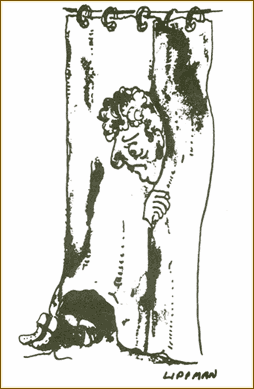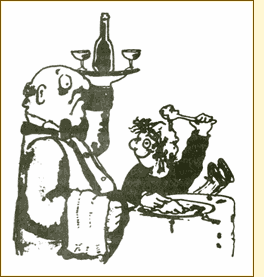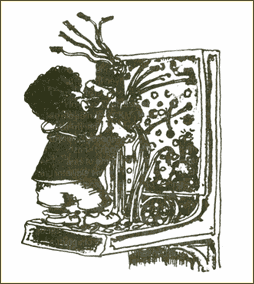|
articles
Working Mother
They're Not Mine
As every mother knows, a child does not need much of an occasion to produce an embarrassing moment; a common, everyday telephone call will do. I have been known to run sopping from the tub to beat one of my kids to the phone. Because of past experience, I know that a soaked rug is a small price to pay for this sort of prevention.
 Letting any child below the age of puberty answer your telephone is like buying cutlery for Jack the Ripper. No matter what sorts of small fibs or tall tales they're prone to telling, once they lift up that instrument, it's as if they've taken Pentothalthe truth comes out. They could lie about everything from how many cookies they've eaten to whether or not they've done their homework, but if Sears Home Shopping Service calls and you're in the bathroom, Sears Home Shopping Service will find out exactly where you are and what you're doing.
Letting any child below the age of puberty answer your telephone is like buying cutlery for Jack the Ripper. No matter what sorts of small fibs or tall tales they're prone to telling, once they lift up that instrument, it's as if they've taken Pentothalthe truth comes out. They could lie about everything from how many cookies they've eaten to whether or not they've done their homework, but if Sears Home Shopping Service calls and you're in the bathroom, Sears Home Shopping Service will find out exactly where you are and what you're doing.
Another catalytic pitfall is company. The more important the guests, the more precarious the situation. Just try getting away with "Oh, dear, the house is a mess," and chances are your kids
will pipe up with "It always looks like this." Stop worrying about the spots on your glassware-if you have kids, you have enough to handle.
Children sense that they hold the cards when guests are about. They KNOW you are on your best behavior, which is probably why they're not. It's apparently an unspoken code among youngsters that this is the best time to "Get Mom." Unfailingly, the little darling, who you proudly tell your friends loves her baby brother, will wait for a gathering of guests before bopping him on the nose. The three-year-old genius who can read the New York Times becomes mute, and the reticent fouryear-old inexplicably decides to become a top banana, forcing a barrage of jokes and riddles on your boss.
Whatever you do, don't leave your children alone with visitors. Once you're out of earshot, kids are capable of flagrant indiscretions. They'll tell everything they know-or think they know-about you, your bank balance and your bedroom habits to absolute strangers. And what they say might well be misconstrued. My son Jesse nearly destroyed a marriage and a six-year friendship by telling my neighbor Freya that he often saw her husband in my bedroom. What he meant was that he saw her husband from my bedroom while looking out the window, but that's not the way it came across.
 Money, a subject that's socially taboo when discussed in anything but generalities, is a favorite of kids. One of the most memorable embarrassing moments of my life occurred when my son was six. While I was looking in a store window, he walked up to a blind man and began counting the coins in his cup. Jesse happily informed the man that there was $2.50 in the cup, which wasn't very much, but pretty good considering that no one had taken any pencils, adding that $7 more would give him enough to buy an intergalactic ray gun. Jesse blithely suggested that there was more money in lemonade than in pencils before I dragged him away, making apologies and stuffing several bills into the cup as we left.
Money, a subject that's socially taboo when discussed in anything but generalities, is a favorite of kids. One of the most memorable embarrassing moments of my life occurred when my son was six. While I was looking in a store window, he walked up to a blind man and began counting the coins in his cup. Jesse happily informed the man that there was $2.50 in the cup, which wasn't very much, but pretty good considering that no one had taken any pencils, adding that $7 more would give him enough to buy an intergalactic ray gun. Jesse blithely suggested that there was more money in lemonade than in pencils before I dragged him away, making apologies and stuffing several bills into the cup as we left.
Any public place offers a child an opportunity to humiliate you, particularly stores. If at all possible, avoid taking a child into a clothing shop. Not only might you wind up buying something you'll hate as soon as you get home, but you might not be able to return to the place for months. My kid's favorite pastime used to be hiding beneath racks of dresses. This might seem harmless enough, but if I didn't catch him in time, some poor, unsuspecting woman browsing through the size 12s would be ambushed with a Geronimo-like shriek of "GOTCHA!"' This, needless to say, would effectively prevent me from coming home with the bargain of the year.
Kids also have a fascination with closed curtains. It's very disconcerting when you think you're alone in a dressing booth with your three garments and a mirror to find yourself being spied upon by a peeping tot. And
its worse when you are not in the dressing room yourself and you hear your tots voice booming out critical comments on someone who is.
For really gut-felt chagrin, there's nothing that comes close to taking children to other people's homes. All kids are observers, and vocal ones at that. They have a natural compulsion to comment on everything they see-from draperies ("They look like old spinach') to dinner ( .. It tastes like old spinach") to pets ("He smells like old spinach"). Kids know what they don't like and say so. Take my advice when visiting: no matter what it costs for a babysitter, get one.
Another danger zone to beware of is restaurants. What kids can do in restaurants to embarrass you is a testament to their creativity and infallible timing. As toddlers, my children had a remarkable physiological response to eating out. Invariably, they'd wait until we were comfortably settled in a restaurant before exhibiting symptoms of intestinal flu.
When they weren't ill, they were talkative ("Look at that man slurp his soup'''). And when they weren't talkative, they were doing strange things to the mashed potatoes. And when they weren't doing strange things to the mashed potatoes, they were doing them to each other.
This has little to do with teaching children basic manners. My kids knew to chew with their mouths closed, keep their elbows off the table and say "please," "thank you" and "excuse me" at the appropriate times. I just never taught them not to make rocket ships out of mashed potatoes, that's all.
Keep in mind that being in any confined space with a child is a potentially hazardous situation. Look out for libraries, religious institutions, airplanes, buses, trains and especially elevators. On the street. when your kids laugh at someone's hat, you can pretend you don't know them. But in an elevator, when they're holding your hand, it's a tough thing to pull off. Use stairs whenever possible; you can always lag a step or two behind.
 A common trap for working mothers is the office. Kids always want to see where their mom works, and mothers who don't know better always want to show off their kids. It's an instinct, but lemmings have similar ones, and if you can fight it—do! The way children behave at home is no guarantee of how they will behave at your office.
A common trap for working mothers is the office. Kids always want to see where their mom works, and mothers who don't know better always want to show off their kids. It's an instinct, but lemmings have similar ones, and if you can fight it—do! The way children behave at home is no guarantee of how they will behave at your office.
I've seen four-year-olds do things to typewriters that you wouldn't want done to war criminals. The boss's kids can get away with it, but try explaining to management that your child thought the switchboard was a new kind of video game-and don't hold your breath for a Christmas bonus.
Sex is a veritable minefield of embarrassment. When it comes to imparting newly acquired knowledge, kids have no equal-they'll share what they know with just about anyone. My nephew once informed a very sweet-looking old lady on a crosstown bus that hamsters have penises just like people do. Though this was no revelation to her, I'm sure the woman was slightly taken aback. When she murmured a polite "That's nice," my nephew added that whales have vaginas as big as basketballs. We made a speedy exit.
On the other hand, in defense of kids, it should be acknowledged that parents are inherently embarrassing to their children. This has been true down through the ages. I'm certain that Christopher Columbus, Jr., had more than a few awkward moments attempting to explain his dad, as Anna Freud did hers, which is to say nothing of the Einstein brood or the Wright brothers' progeny.
As far as my kids are concerned, I'm always embarrassingly behind the times. How could anyone not know the nature of The Hulk's metamorphosis? That Meat Loaf sings? That Rock is "out" and Punk is "in"? That nobody but nobody wears a sweater in weather above 16 degrees? I am aware of this knowledge gap and try to decrease those uncomfortable instances that might leave trauma stains upon young psyches, but I am not always successful.
Last week, my husband and I went to our son's fifth-grade class for Open School Night. Our first goof was mistaking the captain of the baseball team for a girl; our second blunder occurred when we praised the teacher for a rather interestingly handcrafted globe of the world-which, unfortunately, turned out to be a papier-mache model of the human brain.
I didn't think we'd done too badly, until I overheard a little girl ask my son whose parents we were. His answer came back loud and painfully clear: "They're not mine!"
|